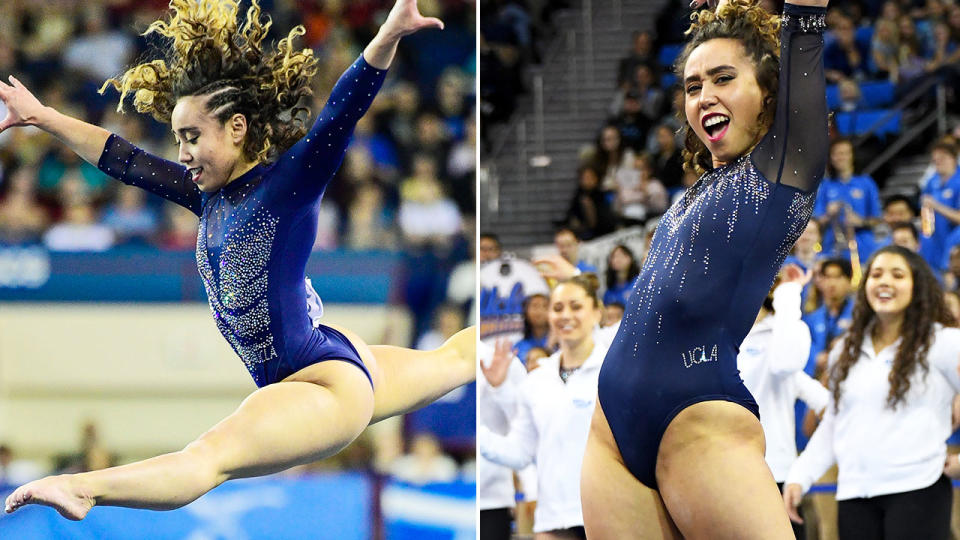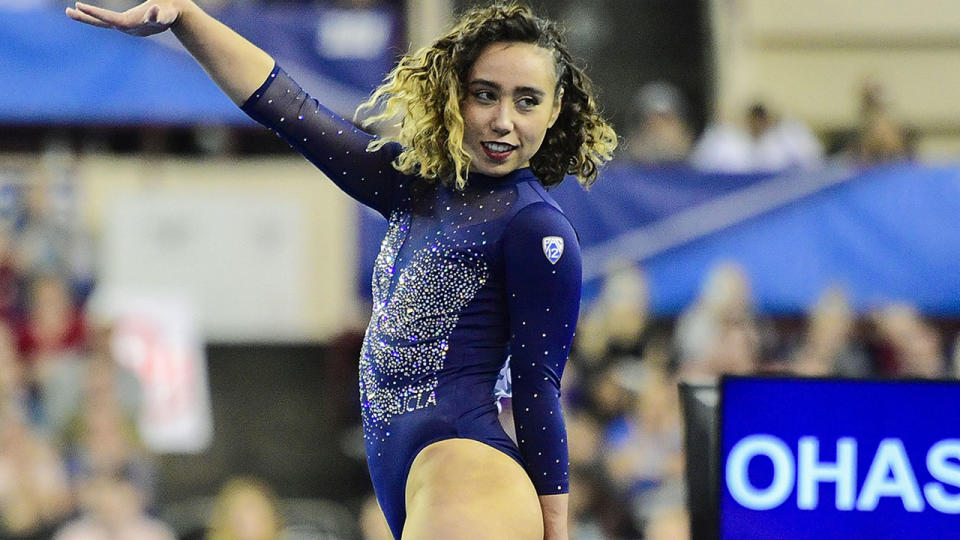'I was handcuffed': American gymnast exposes ugly fallout from viral fame
Katelyn Ohashi soared to internet fame this year after her UCLA gymnastics routine went viral.
The perfect-10 performance set to pop music and featuring an exuberant Ohashi has been viewed nearly 44 million times on Twitter.
SUPERSTAR: Simone Biles makes gymnastics history with unprecedented feat
A former Team USA member, she brought a positive light back to the sport and made media appearances from coast to coast.
But the 2019 UCLA graduate didn’t make a dime off of any of that. UCLA and mainly the NCAA, did though.
A 🔟 isn't enough for this floor routine by @katelyn_ohashi. 🔥 pic.twitter.com/pqUzl7AlUA
— UCLA Gymnastics (@uclagymnastics) January 13, 2019
When NCAA president Mark Emmert called to congratulate her, she shot back with “You should be thanking me.”
In a video op-ed for the New York Times titled “Everyone Made Money Off My NCAA Career, Except Me”, Ohashi said she was “handcuffed” by the NCAA and slammed the organisation for its rules.
"Along with this came a lot of attention and opportunities, but I couldn't capitalise on them,” she wrote.
“I was handcuffed by the NCAA rules that prevented me from deriving any benefit from my own name and likeness, regardless of the fact that after my final meet, I had no pro league to join.
"The NCAA is a billion-dollar industry built on the backs of college athletes. How different would things be for me had I been able to use my image and name my last year of school in order to promote the things I want to further my future? I want to make sure the next person doesn't have to wonder."

The Fair Pay to Play Act in California would change that for athletes down the line and Ohashi was in “The Shop” room with LeBron James when governor Gavin Newsom signed it into law last month.
The law allows student-athletes to profit off their own name and likeness. It has drawn support as well as criticism from not only fans, but coaches and leaders in NCAA circles.
Ohashi clarified some of the misnomers in her piece for the New York Times.
“It’s not about paying salaries to college athletes, it’s about empowering student athletes to rightfully earn off their individual name and likeness without sacrificing their opportunity to get an education,” she said.
“It’s about making sure if a student-athlete’s jersey is still selling in the bookstore 10 years after graduation, they get a cut.
“It’s about recognising that women only receive 4 percent of coverage in sports media and giving us the freedom to leverage sponsor deals to break through.
“It’s about treating student athletes with the same respect as any other students who can freely profit off their talent as writers, artists, DJs, programmers or scientists while in college.”

Why Ohashi has the right to speak out
Ohashi has one of the strongest perspectives to stand on when arguing for the bill. She shot to fame because of a viral video, one in which she performed a talented act and earned her institution as well as the NCAA money.
She performs a sport that doesn’t get much broadcast time and generally keeps athletes for all four years of college, a big get for the NCAA. There is no professional league to move into, though she did perform one last time at the Aurora Games this summer.
She is a woman, which means she automatically receives less attention than her male counterparts. More people watched UCLA gymnastics, and the sport as a entirety, because of her. She became arguably as popular as Simone Biles.
And she is a fan of poetry, having started writing for herself and launching a website for her and a teammate to share their work.
If she weren’t an athlete, rather some random student in the senior class, she could have set up a way to monetise it. She could also have released a book while her fame was highest — a book she put her own work, effort and talent into without the help of the NCAA — but the NCAA didn’t allow it. She still plans to eventually release books, including children’s books.
The Pac-12 argued that the bill will ultimately hurt women athletes, which as Yahoo Sports’ Liz Roscher detailed couldn’t be farther from the truth. Ohashi’s story is exhibit A of that.
“From experience, allowing an athlete — especially women or Olympic-sport athletes, who, for the most part, are staying and graduating from NCAA institutions — to take advantage of unexpected moments like I had empowers us to help finally earn what we deserve,” she said.
The NCAA is unhappy with the law and is expected to challenge it before its set to go into effect in 2023.